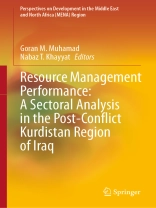This book investigates the intricacies of resource management performance across various sectors within the Kurdistan Region of Iraq. With 13 in-depth studies, it examines the region’s evolution from an agricultural society to an emerging market since the collapse of the Saddam Hussein regime in 2003. Oil and gas revenue, comprising over 85 percent of fiscal revenues, has attracted multinational companies and international humanitarian organizations, although external factors such as the ISIS conflict and global economic downturns have hindered their performance. Additionally, conflicts with Baghdad and the fallout of the ISIS war have led to double embargoes and economic crises, exacerbated by the region’s provision for 2 million refugees and internally displaced persons. International entities like the IOM and UNDP have played vital roles in supporting the region’s development amid these challenges. Despite these obstacles, the Kurdistan Region demonstrates significant economic potential. By scrutinizing resource management in sectors such as education and electricity, this book offers valuable insights and policy recommendations for researchers, decision-makers, and organizations invested in the region’s growth and stability.
Table des matières
Part I: Introduction to the Book.- 1. Integrated Approaches for Strategic Development: Perspectives on Resources, Strategies, Infrastructure, and Agriculture.- Part II: Resources Management and Development.- 2. Political Economy of State Formation in the Kurdistan Region of Iraq: Challenges and Opportunities!.- 3. Charting the Course: Geopolitical Dynamics and Market Realities in the Iraqi Kurdistan Energy Sector.- 4. The Interplay Between Resource Wealth and Tax Revenue: Implications for Fiscal Policy and Institutional Development in the Kurdistan Region.- 5. The Impact of Resource Management on the Growth of Multi-National Corporations in The Kurdistan Region of Iraq.- 6. How the UN Mission Affects the Socio-Economic Performance in the Kurdistan Region of Iraq?.- Part III: Resources-Based Strategies for Development: Business Organizations, Technology, and Social Media.- 7. Assessment of Business Membership Organizations in the Kurdistan Region, Iraq: Analysis with Recommendations for Action.- 8. The impact of leadership styles on employee motivation and commitment in public and private sectors in the Kurdistan Region of Iraq.- 9. Impact of Information and Communication Technology on Human Resource Management Performance.- 10. How Social Media Affect the Vacation Travel Planning?.- Part IV: Infrastructure and Agricultural Development.- 11. Investigating the Impact of Risk Factors on Cost Estimate Inaccuracy Caused by Project Cost Overrun in the Kurdistan Region’s Public Sector Construction Projects.- 12. What Determines a Household Electricity Consumption?.- 13. The Role of Agricultural Production on the Economy of the Kurdistan Region.- 14. Agriculture Employment and Economic Growth in the Kurdistan Region of Iraq.- Part V: Summary, Conclusion and Policy Implications.- 15. Integrating Resources-Based Strategies for Sustainable Growth.
A propos de l’auteur
Goran M. Muhamad is an experienced economist who has a series of qualifications in economics, including an M.Sc. from the University of Nottingham, UK, and a Ph.D. from the University of Kurdistan Hewler. He has an in-depth knowledge of economic discipline contributing to teaching and scholarship activities. He has worked in various sectors, such as academia, consultancy, and management recognised for his positivity, highly organized, detail-oriented and collaborative. His research areas include Development Economics, Natural Resources Economics, Environmental Economics, Private Sector Development and post-conflict affected countries. His strength lies in the development of interdisciplinary empirical approaches for analysing issues where economic variables interact or intersect with non-economic variables of political, governance institutions, and agri-environmental resources. His research is internationally recognized and published in excellent peer-reviewed international journals and books.
Nabaz T. Khayyat is an engineering economist with an MSc and a Ph D in IT Engineering from Seoul National University (Seoul, South Korea), and a second Ph D in Economics from Swiss Management University (Zurich, Switzerland). He works as a country director of AWA Organization for Sustainable Development in Iraq. He was Vice President for Academic Affairs, at Knowledge University, and the Head of the Economics and Finance Department at the University of Kurdistan Hewler. He has also worked in the Faculty of Business at the University of Liverpool in the UK. Dr. Nabaz has published numerous books and articles in international journals. He also supervised numerous students in their master’s and Ph.D. studies at the University of Liverpool and the University of Kurdistan Hewler.












